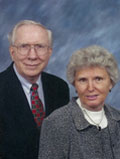About the Donor

Kenneth and Betty
Barker
Kenneth Barker was born in 1932 in Benham, NC. He earned a B.S. degree in agronomy in 1956 and an M.S. degree in plant pathology in 1959 at North Carolina State University (NCSU). After receiving a Ph.D. degree in plant pathology at the University of Wisconsin in 1961, he continued in that department as an assistant professor until 1966. He then rejoined NCSU as an associate professor of plant pathology, becoming professor in 1971 and emeritus professor upon retirement in 1998. For several years, he also served as a shared-faculty member of the United States Department of Agriculture CSREES.
His multifaceted research program spanned the basic and applied areas of science with primary emphasis on the ecology, physiology, and management of plant-parasitic nematodes. Key contributions include mechanisms of nematode damage and related thresholds; population dynamics and associated environmental impacts; nematode-microbe interactions, including the physiology of nitrogen-fixing bacteria and various types of nematodes; and target-specific management tactics/strategies. Much of his research was supported in part by numerous grants from a number of sources. His work on the quantitative facets of nematode diversity and their population dynamics was basic to the development of the first Nematode Advisory Laboratory in the United States.
A large number of outstanding graduate students, post-doctoral fellows, and visiting scientists from around the world worked in Barker’s laboratory. Many of these scholars have become leaders in research, extension, and industry. As departmental graduate studies coordinator for more than a decade, he contributed significantly to the development of one of the top nematology and plant pathology programs in the United States. This included his teaching an advanced course in nematology as well as other courses. He also served on the faculty senate and many departmental and university committees at NCSU.
The Society of Nematologists (SON), the international nematology community, and The American Phytopathological Society (APS) benefited much from Barker’s participation and leadership. He was president of SON, editor-in-chief of the Journal of Nematology, and chaired numerous SON committees. At the international level, he collaborated with nematologists in many countries, chaired a special study group that focused on organizing an International Nematology Federation, and served as the first president of the resulting International Federation of Nematology Societies. He also was very active in various capacities in APS, including as senior editor for APS PRESS. After retirement, he continued writing and editing—adding to an extensive record of research, review, and book contributions. For example, he chaired a 20-member national Task Force for CAST resulting in the 2003 publication “Integrated Pest Management: Current and Future Strategies.” For his research accomplishments and leadership, he was elected a Fellow and Honorary Member of SON and Fellow of APS.
Kenneth Barker passed away in August 2022.
Betty Barker was borne Betty Flynt in 1933 in Winston Salem, NC. Upon completion of her education, she worked for Reynolds Tobacco. In 1958, she and Kenneth were married in her home church. As newly weds, they moved to Madison, WI, where Betty worked with a library-supply firm, providing partial support of her husband’s graduate (Ph.D) studies. She continued in that position while her husband was on the plant pathology faculty at Madison.
Upon their move to Raleigh and NCSU, Betty became a stay-at-home mom, nurturing their two young daughters. She also cohosted prospective graduate students and visiting scientists during their visits to NCSU as well as periodic functions for the nematology graduate students. After both daughters commenced their university studies, Betty worked part-time as a food-quality analyst in the Food Science Department at NCSU. She continued that work until her husband’s retirement.
In addition to her parenting and part-time employment, Betty did volunteer work for the elderly via a long-term commitment to Meals on Wheels. While managing their primary and second homes and enjoying four grandchildren, she maintained her commitment to Meals on Wheels as well as her involvement in church.
